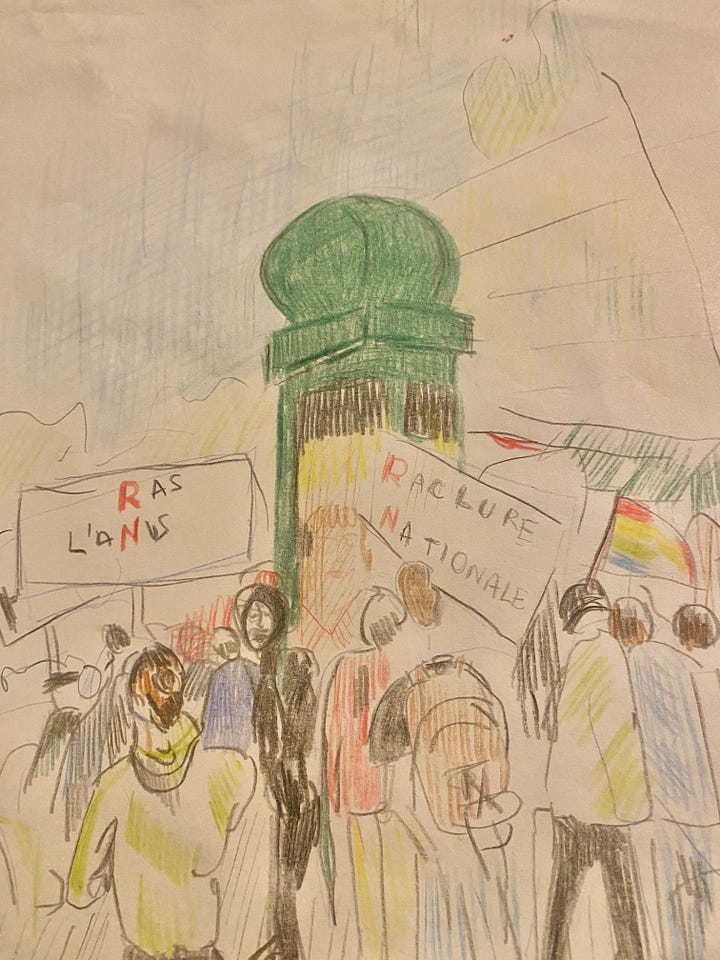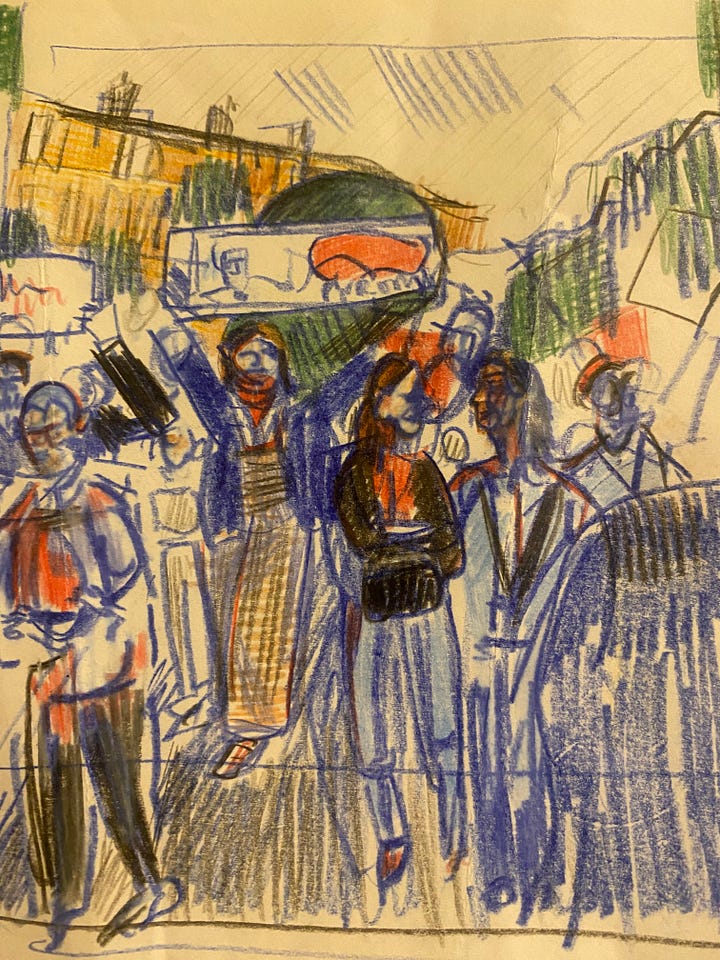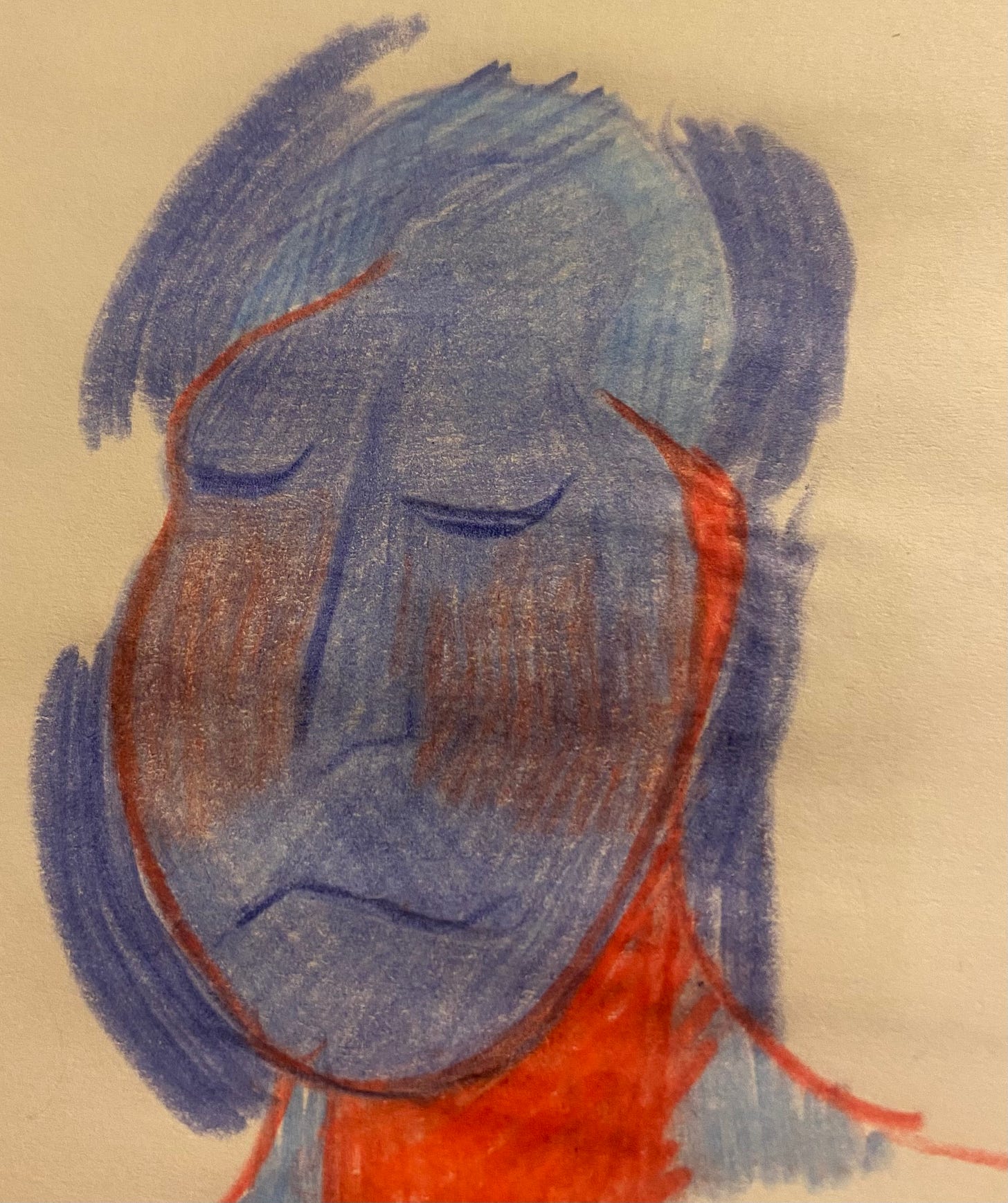Dear Friend,
I hope you are well.
Please excuse the hiatus in my letters since I last wrote in June, following the announcement of Macron’s snap parliamentary elections in France.
My excuse, if you’ll allow me one, is the sprint I’ve been undertaking to submit the approximately 7597 documents required for my French nationality application.
I have been planning to apply for a French passport since I moved back to Paris in 2017, the year after the vote for Brexit. In order to be eligible, I first needed to live here for five years, which I happily proceeded to do. After that, I spent about a year procrastinating for fear of the associated paperwork, and then another year doing this paperwork.
Last week, I finally submitted it! The next step now is for the French authorities to study my application, ask for any missing documents among the 7597 (there will surely be some) and then, if my dossier is found to meet the minimum criteria, I will be called for an ‘entretien de naturalisation’. At these interviews, an agent of the police prefecture asks a series of questions to ascertain whether the candidate has sufficient knowledge of French history and culture to be made a citizen.
Optimistically, I have already started preparing for a possible interview by studying ‘le livret du citoyen’, a pamphlet which the French Government has put together laying out the principles and values of the Republic.
Now, I like to think I have a pretty good working knowledge of French culture, otherwise WHY WOULD I BE SO BOLD AS TO SEND YOU THESE LETTERS. However, even I must admit that I learned and noticed new things by reading the livret. Inside there’s notably a list of all the rights laid out in the Déclaration des droits de l'homme et du citoyen de 1789, a foundational document of the French Revolution to which the country still adheres.
I was struck by how rousing, even moving, it was to read many of the rights written down, and also by the gap between what they promise and the reality of life in France for many.
FR: Art. 6. “La Loi [… ] doit être la même pour tous, soit qu’elle protège, soit qu’elle punisse. Tous les Citoyens étant égaux à ses yeux sont également admissibles à toutes dignités, places et emplois publics, selon leur capacité, et sans autre distinction que celle de leurs vertus et de leurs talents.”
EN: “The law must be the same for everyone, both in protection and punishment. All Citizens, being equal in its eyes, are also eligible for all dignities, public positions and jobs, according to their ability, and without any other distinction than that of their virtues and talents.”
I have written before about the gap between the beautiful principles of the French Republic and the messier realities of life in France – the ways in which the nation falls short of its ideals. The Rassemblement National (RN) – who garnered the largest share of the vote in in the first round of the vote – however, want to go further: they wish to make explicit the idea of a distinction between one kind of Frenchness, their kind, with another kind – a contingent kind.
The party has already announced what policies they would implement if the second round granted them an outright majority and Jordan Bardella was made prime minister. In and amongst glossy imagery of the young darling of the right, the party’s manifesto lays out their old-fashioned National Front credo, the préférence nationale. This encompasses propositions such as denying the eventual right to French citizenship to children born in France to foreign parents (already not an automatic right), and the blocking of French people with double nationality from certain ‘strategic’ government positions.
There’s also a whole host of ugly policies under the banner of “Préserver le peuple français de la submersion migratoire”, or ‘protecting the French people from the migratory flood’. This includes making it easier to deport migrants and asylum-seekers and making it much more difficult for them to access healthcare.
This week the left alliance, the Nouveau front populaire and Macron’s party Renaissance have been involved in complicated negotiations for the second round, agreeing to only stand one candidate against the RN in more than 200 constituencies. This ‘horse-trading’, as some in the UK media have described it, is an example of the well-established ‘republican front’ that has kept the far right far from power since World War Two.


Meanwhile, here in the UK the votes are being counted in what looks to be the general election that will put Labour in power for the first time in 14 years – and with a landslide majority. The 2010 election in which David Cameron was elected was the first one I voted in when I was a student in Manchester. It was an entirely different time when Gordon Brown caught on mic calling someone who sounded quite bigoted a “bigoted woman” passed for a political scandal.
In the years since then I have lived back and forth between England and France. I was living in Paris when Cameron won his referendum-promising campaign in 2015. I was back in London when the country voted for Brexit in 2016, before moving back to Paris the year after.
A political podcast I listen to called The Newsagents opened their last episode with an audio montage of these last 14 years of Conservative rule — from the coalition to the referendum, to Theresa May to BoJo, partygate, Truss’s budget and Ready for Rish. The cumulative effect made me feel vaguely unwell.
When I was at university in Manchester, yearly fees were already £3000. I also had a grant to cover the cost of them. A few years later, the fees had tripled again, to £9000, and the same grant had been abolished. This is just one example of the unravelling of state provision in the austerity measures that characterised what we now think of of the milder half of the last Conservative years. That was before Brexit and the reckless flailing of Johnson and colleagues that ensued.
What Labour might actually do remains to be seen. Unlike the new Front Populaire in France, and even the gruesome Rassemblement National, their policy proposal up until now has been thin. For the moment, most Brits will be happy for the change, but the party will soon need to paint a more specific picture of how they plan to restore optimism to a tired country.
When I moved back to Paris in 2017, when Macron beat Le Pen in the second round of the presidential elections, there was a general sense of relief (in Paris, at least). But as the president has appeared increasingly tin-eared, culminating in the forcing-through of the pension bill last year, faith in his project has broken down almost entirely.
The French and British systems, the people and their sensibilities are very different — but there is some kind of lesson there about how just being ‘not as bad as them’ is not enough.
Still, for now, as a Brexit-jaded Londoner, I am pleased to see change. As a Parisian, I am still puzzled by the president’s decision to call this roulette-election, and hope that we’re spared the worst of the Bardellian flood.
Thirty-second book club
I am currently reading The Underground Railroad by Colson Whitehead. Telling the story of a woman running from slavery in Georgia in the 1800s. The writing is as elegant and thoughtful as the historically accurate subject matter is ghastly.
Thank you for reading this letter. I hope Election Week is treating you well, wherever you observe it.
Leaning into a more joyful celebration of Paris, I recently wrote this three-day itinerary for Condé Nast Traveller. I would be honoured if you referred to it on your next trip (or staycation).
I will write very shortly.
Yours,
Hannah





If you’re interested in reading another one of Colston Whitehead’s books, I would recommend “The Nickel Boys.” It came out around the BLM protests in the U.S.
Best of luck with obtaining French nationality ! Hopefully the French government doesn’t need too many things. I would a perfect dossier, but I think we both know the French government prefers to make everything not easy. Lol
Hey Hannah. Gosh, it's been a crazy week or two of politics. So much going on.
I feel for your giant dossier. Sounds like a nightmare. Hope it proceeds smoothly. I need to do my own for Australian citizenship (I have been eligible for quite a few years, but, err, I've just been lazy because it wasn't overly pressing) and I'm thankful it's a far shorter process.
The Underground Railroad has been on my list for a long time and I always see it there on the shelf whenever I'm in my local bookstore.